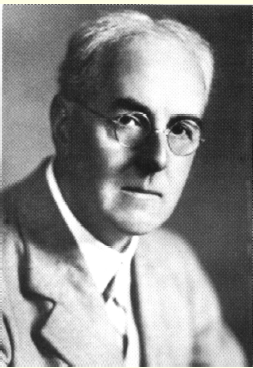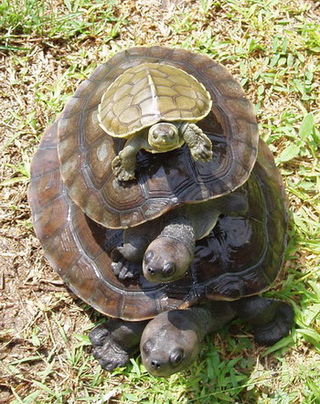Related Research Articles

Frederic Ogden Nash was an American poet well known for his light verse, of which he wrote more than 500 pieces. With his unconventional rhyming schemes, he was declared by The New York Times to be the country's best-known producer of humorous poetry.

Flea, the common name for the order Siphonaptera, includes 2,500 species of small flightless insects that live as external parasites of mammals and birds. Fleas live by ingesting the blood of their hosts. Adult fleas grow to about 3 millimetres long, are usually brown, and have bodies that are "flattened" sideways or narrow, enabling them to move through their hosts' fur or feathers. They lack wings; their hind legs are extremely well adapted for jumping. Their claws keep them from being dislodged, and their mouthparts are adapted for piercing skin and sucking blood. They can leap 50 times their body length, a feat second only to jumps made by another group of insects, the superfamily of froghoppers. Flea larvae are worm-like, with no limbs; they have chewing mouthparts and feed on organic debris left on their hosts' skin.
Poetry analysis is the process of investigating the form of a poem, content, structural semiotics and history in an informed way, with the aim of heightening one's own and others' understanding and appreciation of the work.

Lewis Fry Richardson, FRS was an English mathematician, physicist, meteorologist, psychologist, and pacifist who pioneered modern mathematical techniques of weather forecasting, and the application of similar techniques to studying the causes of wars and how to prevent them. He is also noted for his pioneering work concerning fractals and a method for solving a system of linear equations known as modified Richardson iteration.

"Turtles all the way down" is an expression of the problem of infinite regress. The saying alludes to the mythological idea of a World Turtle that supports a flat Earth on its back. It suggests that this turtle rests on the back of an even larger turtle, which itself is part of a column of increasingly larger turtles that continues indefinitely.
In Latin literature, Augustan poetry is the poetry that flourished during the reign of Caesar Augustus as Emperor of Rome, most notably including the works of Virgil, Horace, and Ovid. In English literature, Augustan poetry is a branch of Augustan literature, and refers to the poetry of the 18th century, specifically the first half of the century. The term comes most originally from a term that George I had used for himself. He saw himself as an Augustus. Therefore, the British poets picked up that term as a way of referring to their endeavours, for it fit in another respect: 18th-century English poetry was political, satirical, and marked by the central philosophical problem of whether the individual or society took precedence as the subject of the verse.

An Essay on Criticism is one of the first major poems written by the English writer Alexander Pope (1688–1744), published in 1711. It is the source of the famous quotations "To err is human; to forgive, divine", "A little learning is a dang'rous thing", and "Fools rush in where angels fear to tread".

Pseudomathematics, or mathematical crankery, is a mathematics-like activity that does not adhere to the framework of rigor of formal mathematical practice. Common areas of pseudomathematics are solutions of problems proved to be unsolvable or recognized as extremely hard by experts, as well as attempts to apply mathematics to non-quantifiable areas. A person engaging in pseudomathematics is called a pseudomathematician or a pseudomath. Pseudomathematics has equivalents in other scientific fields, and may overlap with other topics characterized as pseudoscience.
Ad infinitum is a Latin phrase meaning "to infinity" or "forevermore".

A hyperparasite, also known as a metaparasite, is a parasite whose host, often an insect, is also a parasite, often specifically a parasitoid. Hyperparasites are found mainly among the wasp-waisted Apocrita within the Hymenoptera, and in two other insect orders, the Diptera and Coleoptera (beetles). Seventeen families in Hymenoptera and a few species of Diptera and Coleoptera are hyperparasitic. Hyperparasitism developed from primary parasitism, which evolved in the Jurassic period in the Hymenoptera. Hyperparasitism intrigues entomologists because of its multidisciplinary relationship to evolution, ecology, behavior, biological control, taxonomy, and mathematical models.
French poetry is a category of French literature. It may include Francophone poetry composed outside France and poetry written in other languages of France.

Augustan literature is a style of British literature produced during the reigns of Queen Anne, King George I, and George II in the first half of the 18th century and ending in the 1740s, with the deaths of Alexander Pope and Jonathan Swift, in 1744 and 1745, respectively. It was a literary epoch that featured the rapid development of the novel, an explosion in satire, the mutation of drama from political satire into melodrama and an evolution toward poetry of personal exploration. In philosophy, it was an age increasingly dominated by empiricism, while in the writings of political economy, it marked the evolution of mercantilism as a formal philosophy, the development of capitalism and the triumph of trade.
"The Swimmer" is a poem by the Australian poet Adam Lindsay Gordon. The poem is from his last volume of poems Bush Ballads and Galloping Rhymes published in 1870, when he was living at Melbourne. In The Poems of Adam Lindsay Gordon, it is grouped among "Poems Swinburnian in Form and Pessimism, but full of the Personality of Gordon."
The following outline is provided as an overview of and introduction to poetry:

"Tears, Idle Tears" is a lyric poem written in 1847 by Alfred, Lord Tennyson (1809–1892), the Victorian-era English poet. Published as one of the "songs" in his The Princess (1847), it is regarded for the quality of its lyrics. A Tennyson anthology describes the poem as "one of the most Virgilian of Tennyson's poems and perhaps his most famous lyric". Readers often overlook the poem's blank verse—the poem does not rhyme.
"Sea Surface full of Clouds" is a poem from the second, 1931, edition of Wallace Stevens's first book of poetry, Harmonium. It was first published in 1924, so it is restricted by copyright. However, brief parts of it are quoted here as fair use, and the whole poem is available elsewhere on the Internet.

Augustus De Morgan (1806–1871) was a British mathematician and logician best known for formulating De Morgan's laws. De Morgan is also known for coining the term mathematical induction and formalizing the principles underlying induction. De Morgan's contributions to logic have been used in set theory, probability theory, computer science, and other fields.
The following songs were produced by 9th Wonder.

Classical Chinese poetry forms are poetry forms or modes which typify the traditional Chinese poems written in Literary Chinese or Classical Chinese. Classical Chinese poetry has various characteristic forms, some attested to as early as the publication of the Classic of Poetry, dating from a traditionally, and roughly, estimated time of around 10th–7th century BCE. The term "forms" refers to various formal and technical aspects applied to poems: this includes such poetic characteristics as meter, rhythm, and other considerations such as vocabulary and style. These forms and modes are generally, but not invariably, independent of the Classical Chinese poetry genres. Many or most of these were developed by the time of the Tang Dynasty, and the use and development of Classical Chinese poetry and genres actively continued up until the May Fourth Movement, and still continues even today in the 21st century.
"The Flea" is an erotic metaphysical poem by John Donne (1572–1631). The exact date of its composition is unknown, but it is probable that Donne wrote this poem in the 1590s when he was a young law student at Lincoln's Inn, before he became a respected religious figure as Dean of St Paul's Cathedral. The poem uses the conceit of a flea, which has sucked blood from the male speaker and his female lover, to serve as an extended metaphor for the relationship between them. The speaker tries to convince a lady to sleep with him, arguing that if their blood mingling in the flea is innocent, then sexual mingling would also be innocent. His argument hinges on the belief that bodily fluids mix during sexual intercourse.
References
- ↑ For example: Snyed, JR (2019). "Who watches the watchmen and the problem of recursive flea bites". British Journal of Anaesthesia. 122 (4). Elsevier (published 11 December 2018): 407–408. doi:10.1016/j.bja.2018.11.013. PMC 6435839 . PMID 30857594.
- 1 2 De Morgan, Augustus (1872). A Budget of Paradoxes. Longmans, Green, and Company. pp. 376-377.
- ↑ De Morgan, Augustus (1915). Smith, David Eugene (ed.). A Budget of Paradoxes. Vol. II (2nd ed.). Editor's note 334.
- ↑ Swift, Jonathan (1733). "On Poetry: A Rapsody". Swift's Works. Vol. X (1762 ed.). George Faulkner. p. 259. Text from the fascimile reproduction in Elias, AC et al, "The Full Text of Swift's On Poetry: A Rapsody (1733)", Swift Studies, 9 (1994), pp. 17-32.
- ↑ Richardson, Lewis Fry (1922). Weather Prediction by Numerical Processes. Boston: Cambridge University Press. p. 66. ISBN 9780511618291.